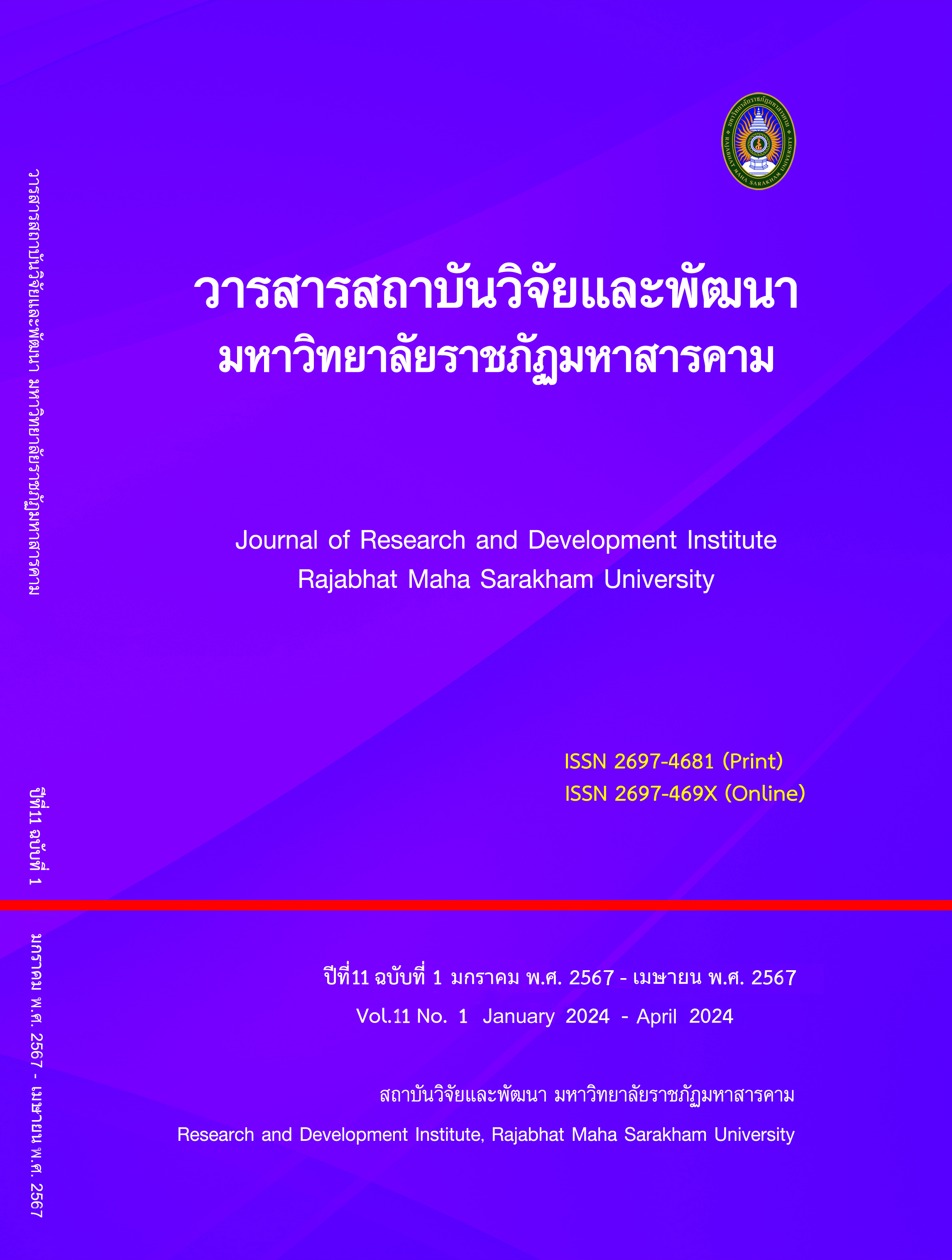The Development of the Basic Program Writing Ability and Learning Achievement by 5 STEPs Learning Management with the Multimedia for Grade 7 Students
Keywords:
5 STEPs Learning Method, Multimedia, Basic programming abilityAbstract
The objectives of this research were 1) To compare basic programming abilities by 5 STEPs Learning Management with the Multimedia for Grade 7 Students after studying, with the criteria for a score of 70 percent. 2) To compare learning achievement by 5 STEPs Learning Management with the Multimedia for Grade 7 Students after studying, with the criteria for a score of 70 percent. The target group consisted of 22 1st grade students who were purposively selected during the second semester of the 2022 academic year. The One-group posttest only design was applied for the experiment. Research instruments included 1) 12 Instructional plans for 5 STEPs learning with multimedia that took 12 instructional periods to complete, 2) Basic Programming Capability Exam It is an 8-item subjective test with rubric scores. 3) an objective test of 30 items for measuring the students’ learning achievement.
The findings show that:
1) The basic programming abilities by 5 STEPs Learning Management with the Multimedia for Grade 7 Students was statistically after studying higher than the 70 percent criterion at .01 level of significance.
2) The learning achievement by 5 STEPs Learning Management with the Multimedia for Grade 7 Students was statistically after studying higher than the 70 percent criterion at .01 level of significance.
References
Chookhampaeng, C. (2016). Curriculum Research and Development Concept and Process. Bangkok : Chulalongkorn University Press.
Institute of Academic Development (IAD). (2021). Active learning management towards creating innovation with advanced thinking processes using the GPAS 5 Steps system. Bangkok : Academic Quality Development (IAD) Company Limited.
Kanthiya, P. (2016). The Development of Analytical Thinking Skills for Science Through Five Steps Learning Management of Secondary School. Master of Education. Chiang Mai Rajabhat University.
National Strategy Secretariat Office, Office of the National Economic and Social Envelopment Board. (2018). National Strategy 2018-2037 . government gazette. Vol 135. episode 82 .
Prommuang, N. (2017). Development of basic spelling skills. with multimedia For Grade 1 students at Demonstration School Chiang Rai Rajabhat University, Mueang District, Chiang Rai Province. (Master of Arts Thesis). Chiang Rai: Chiang Rai Rajabhat University.
Office of the Education Council. (2021). Guideline for promoting teaching and learning in computational science (Coding) to develop learners’ skills in the 21st Century. Bangkok : 21 Century.
Office of the Education Council. (2017). The National education plan B.E. 2017-2036. Bangkok : Office of the Education Council.
Kongpila, O. (2021). The study of the development result of learning activities with the QSCCS process using social media to develop problem-solving skills of secondary school students M 5. Basic Education Research Journal. 1st Edition (July - December 2021)
Yingnok, P. (2021). The study of learning achievement and analytical thinking by using the 5 STEPs learning process with the cooperative learning method STAD technique of 10th grade students. The requirements for master of education in science teaching faculty of education. Burapha University.
Dechakupt, P. (2014). The effects of 5 steps learning process (5 steps). Bangkok : Chulalongkorn University Press.
Bueraheng, S. (2017). Using Harrow’s Instructional Model for Psychomotor Domain with Group Process on Computer Programming Competency of Matthayomsuksa 4 Students. Master of Education in Teaching Science Mathematics and Computer. Thaksin University.
Wanasiri, S. (2017). The Development of Learning Achievement on “The Universe” of Science Learning for Matthayomsuksa 3 students using 5E Inquiry Learning Management together with Multimedia. Master of Education (Curriculum and Instruction) Rajabhat Mahasarakham University.
Sengsri, S. & and Panna, W. (2018). The result of QSCCS learning process and learning resources in the community to promote the ability of mathematical for secondary student. Journal of Education Naresuan University Vol.20 No.4 October – December 2018.
The Institute for the Promotion of Teaching Science and Technology. (2017). Manual for using the technology curriculum (Computing Science) Learning Area of Science and Technology. Bangkok : Aksorn Charoen TAT A.C.T. (25) Company Limited.
Downloads
Published
How to Cite
Issue
Section
License
Copyright (c) 2024 ชาญชัย สุริยบุญ, ดุจเดือน ไชยพิชิต

This work is licensed under a Creative Commons Attribution-NonCommercial-NoDerivatives 4.0 International License.
Articles that are published are copyrighted by the authors of the articles







